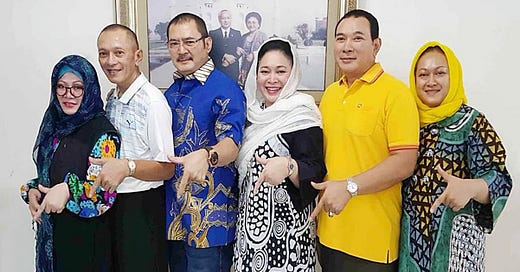For decades, they were among the richest, most powerful – and arrogant – people in Asia, and possibly among the most feared. They ran Jakarta as if they owned it, which indeed they seemed to. They were the children of Indonesia’s dictator Suharto, who ruled the country from 1967 until May 21, 1998, when he was finally driven from power by the Asian Financial Crisis of 1997-1997 and by the excesses of his family, his cronies, and himself.
Unlike the children of the equally corrupt Filipino strongman Ferdinand Marcos, who returned from disgrace and reentered politics to a lenient nation, Suharto’s offspring have so far failed at public life although they remain in Jakarta, largely untouched by the law. Some of the six, such as Titiek and Tommy, sought to use their father's name to gain political support, but failed. Even so, they live in prosperity and are busy managing businesses worth billions of rupiah, the fruit of their father's reign. There have been sporadic efforts to regain some of the stolen funds. In 2019, the government signed a Mutual Legal Agreement (MLA) with Switzerland designed to facilitate the tracing and freezing of assets amassed from criminal acts. But despite initial hopes so far there has been little effort to use it.
Suharto, according to respected organizations that investigated, is alleged to have amassed enormous wealth through corruption, collusion, and nepotism. He granted monopolies to his spawn that gave them control over significant areas of the Indonesian economy. In 2004, Transparency International agency released the Global Corruption Report, ranking Suharto then as the world's most corrupt leader with assets of US$15-35 billion amassed during his 32 years in power. He surpassed others, such as the Philippines’ Marcos, with wealth of US$5-10 billion, and Yugoslav president Slobodan Milosevic with US$1 billion although all are believed to be far beyond Russian strongman Vladimir Putin, who is believed to sit on a fortune estimated in 2013 at US$40-70 billion…




